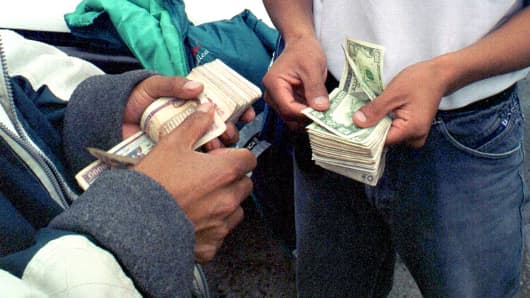Ecuador Out With Own Digital Currency
In 2000, Ecuador moved to ditch its stumbling currency for the U.S. dollar. Now more than 15 years later, the South American country is revamping its monetary system again—using digital currencies.
Ecuador’s Sistema de Dinero Electrónico (electronic money system) kicked off in December by allowing qualifying users to set up accounts, and it will begin acting as a real means of transaction this month.
Once the government flips the switch, the South American nation of 16 million will host the first-ever state-run electronic payment system. (Other countries, such as Sweden, use digital currencies widely, but they’re not state-sponsored.) But the Ecuadorean government says the scheme is designed to support its dollar-based monetary system, not replace it.
Read MoreThe world’s best place to retire—Ecuador???
“Electronic money is designed to operate and support the monetary scheme of dollarization,” economist Diego Martinez, a delegate of the President of the Republic to the Board of Regulation and Monetary and Financial Policy, wrote to CNBC in a comment provided by a central bank spokesman.
Martinez said that Ecuador law expressly states that economic transactions are conducted in U.S. dollars.
Electronic money will not only help the poor, he added, but will act as a cost-saving mechanism for the government: Ecuador spends more than $3 million every year to exchange deteriorating old notes for new dollars, Martinez said. There would presumably be less wear and tear on the currency if much of it was stored at the central bank while citizens relied on mobile payments.
“They keep linking it to their frustration to being on the dollar standard.”
Still, others both inside and outside Ecuador have speculated that the country has broader goals. Claiming that there’s no plausible reason for Ecuador to provide “an exclusive medium for mobile payments,” Lawrence White, a professor of economics at George Mason University, wrote in a recent paper that “it is hard to make any sense of the project other than as fiscal maneuver that paves the way toward official de-dollarization.”
White told CNBC that the government’s bitcoin ban in July and its barring of competing e-money systems demonstrate Quito’s intentions. Although Ecuadorean officials haven’t publicly said they view electronic money as a potential exit from the U.S. currency, “they keep linking it to their frustration to being on the dollar standard,” White said.
Read MoreChina’s new playground: America’s backyard
A digital currency would, in theory, allow Ecuador’s central bank to issue new money that isn’t directly tied to its U.S. dollar reserves. But Ecuadorean officials have repeatedly denied that there are any such plans.
In a letter posted in Spanish on the Banco Central del Ecuador website in August, officials said the proposed payment system is not intended to address the country’s bills, that it will not be used to pay government workers and contractors, and that it will not lead to capital flight.
Ecuador Out With Own Digital Currency
The dollar system has been good for the country’s relatively low inflation and low interest rates, White said, adding that it would be difficult to start a new currency without ruining the economy. Ecuador’s most recently reported monthly inflation rate of 3.67 percent is lower than neighbors including Mexico, Chile, Costa Rica and Bolivia.
At the very least, White said, the government is looking to turn a profit from holding a monopoly on all electronic payments—and if they really wanted to benefit the poor, Quito officials would allow for competing private-sector systems to drive down costs.
Read MoreBeijing still lending to Venezuela—for now
The Central Bank of Ecuador announced earlier this week that it had signed a deal with a 60,000-member taxi organization to accept the electronic money. The project’s second phase—in which users will be able to pay for select services and send money between individuals—will begin in mid-February.
Jorge Calderón, the taxi organization’s president, praised the electronic money system as potentially improving service, since it will not require drivers to stash as much coinage.
“I think quite rapidly people will be using it all over the place…The plan is quite aggressive—they really want the whole population to use it as soon as possible.”
A third phase of the electronic money system will begin in the latter half of this year, according to government announcements, and will allow users to pay for public services like taxes through mobile payment.
Fausto Valencia, who is overseeing the project for the central bank, said the government expects about 500,000 people to sign up in 2015, according to several Ecuadorean reports.
Read MoreThe new Chavez? Oil trumps rain forest in Ecuador
“I think quite rapidly people will be using it all over the place,” said Paul Buitink, a cryptocurrency expert who teaches at Universidad San Francisco de Quito. “The plan is quite aggressive—they really want the whole population to use it as soon as possible.”
Buitink said the project has been relatively well received by the Ecuadorean public. There are some concerns about privacy, he said, but it has generally been seen as a positive step.
Not to be confused with bitcoin
Despite several headlines to the contrary, Ecuador’s electronic money system is dissimilar from bitcoin. While the world’s most popular cryptocurrency is a digital token running on a decentralized (yet cryptographically secured) electronic network, Ecuador’s new project would be controlled by the government and tied directly to the local currency—the dollar.
The project initially created buzz in in the bitcoin blogosphere, but that interest faltered once it was clear that Ecuador’s project would not present a competing alternative. Not only is the technology importantly different, but Ecuador’s electronic money system currently can be accessed only by qualifying citizens and residents.
Read MoreCNBC Explains: How bitcoin works
In fact, Ecuador’s project is more similar to M-Pesa, a mobile phone-based money transfer service started by Vodafone, according to Pete Rizzo, the U.S. editor for cryptocurrency site CoinDesk.
In many ways, the new system will be a government-run version of Venmo—users will be able to make payments with the aid of a cellphone and store value in their accounts. But unlike the popular smartphone application, the Ecuadorean version will be able to run on “dumb” mobile devices too.
The electronic money system does not require Internet access or an account with a financial institution, and it can be redeemed for physical money at any time, the central bank’s website said.
Correction: This version corrected the spelling of Fausto Valencia’s name.





